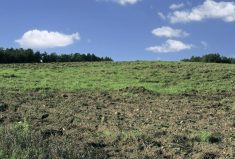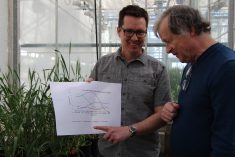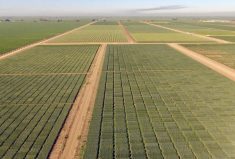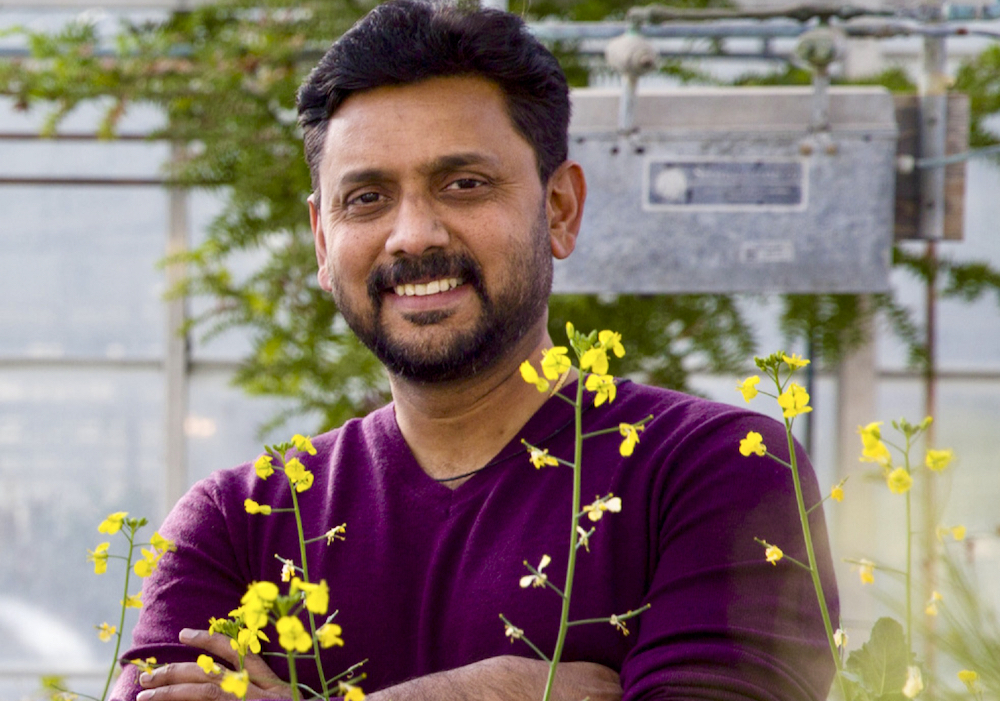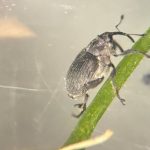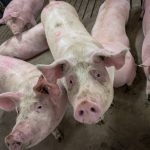In what many believe will be a turning point for agriculture here, the Canadian Food Inspection Agency has legalized the growth and marketing of crop varieties developed with gene editing.
That has fired up Jason Lenz’s imagination about the technology’s impact on food waste and food security — and also on flea beetles.
“Food security has been on our mind for a few years now and this announcement is certainly going to help address food security challenges,” the Bentley-area farmer and Alberta Wheat vice-chair said following the CFIA’s announcement earlier this month.
Read Also

‘Millions will die’: Foodgrains Bank faces $2.7B federal funding threat
Foodgrains Bank warns $2.7B aid cut triggers a humanitarian crisis, risking global hunger relief and 40 per cent of its funding.
“There’s lots of talk about food wastage right now. To a farmer, food wastage isn’t what’s happening at the restaurants or at the grocery stores. The biggest food wastage can actually happen within a field.
“If we don’t have the technology in our plants and the products we use, flea beetles can completely wipe out a canola crop — a whole quarter section-size field. Think of the waste in food by not allowing technology like gene editing in our plants. That’s probably the highest level of food wastage you can talk about.”
The CFIA’s new guidance makes Lenz’s flea beetle-resistant canola dream a distinct possibility.
It essentially sets gene-edited seeds on the same regulatory level as conventionally bred varieties, meaning varieties developed using gene editing will not be considered genetically modified organisms.
However, the resulting plant must not contain DNA from other species. In those cases, the CFIA would require additional assessment.
The Health Canada division said it’s the “scientific opinion of (the agency) that gene editing technologies do not present any unique or specifically identifiable environmental or human health safety concerns as compared to other technologies of plant development.”
Universities and biotech companies have been preparing for the day when gene editing would receive this regulatory approval.
There are projects on the go, including potential solutions to flea beetles and sclerotinia in canola, said Curtis Rempel, vice-president of crop production and innovation with the Canola Council of Canada.
“The University of Manitoba has really good RNAi for flea beetle and sclerotinia,” he said.
RNAi stands for RNA interference, a double-stranded RNA sequence that can target a single characteristic of a specific pest without impacting any other organisms.
Another Canadian effort involves using gene editing to increase the heat tolerance of canola pollen. This is the work of Performance Plants, a biotech company in Kingston, Ont., that has identified an opportunity to raise the viability of canola pollen to about 36 C, said Rempel.
“Typically, pollen, at around 29 C, starts dying in a big way,” he said. “When you have temperatures going above 29 C for an extended period of time, you tend to lose yield. All that pollen that could be pollinating flowers to set seed is dying and not working.
“When you think about changing climate, if you could change that by bringing viability up to 35 C or 36 C, Bob’s your uncle. That goes a long way to making canola more of a hotter crop.
“The engineering isn’t too complex but you need to have this precision gene editing tool. You can’t do it through basic plant breeding.”
Another genetic editing project by Performance Plants involves what Rempel calls “deep rooting,” or extending canola roots’ already large reach into the soil to enable better carbon sequestration.
“When you want to sequester carbon in that top 20 centimetres of soil, there’s enough microbial respiration going on that you get soil mineralization, so some of the carbon is going to be released into the atmosphere,” he said.
“But when you’re looking at putting carbon away for a long, long, long time without it getting back in the atmosphere, plants with deep roots do that the best.”
Rempel said Performance Plants has been able to increase the canola tap root by 25 per cent, so it can go 25 per cent deeper into the soil.
“So of course that’s better for drought tolerance.”
Many grower groups lined up to praise the CFIA for its decision.
Chris Davison, vice-president of stakeholder and industry relations with the Canola Council of Canada, said it is needed in Canada to keep the ag sector competitive.
Ultimately, the CFIA’s “science- and risk-based approach” to plant breeding regulation will help align Canada with many of its trading partners, he said.
“Simply put, we need these tools in order to advance our priorities and ensure the continued growth and success of the industry,” he said. “Over time we would expect to see more and better plant varieties that are resilient to pests and other plant stressors as well as plant varieties that are going to help canola growers continue to produce more high-quality crops in our ever-changing production circumstances. That’s really key.”
However, other groups say the move threatens the country’s organic sector.
Given organic standards allow only for conventionally bred crops and not for gene-edited or genetically modified ones, the result will be “unknown (genetically modified) foods and seeds on the market that have not been subject to any independent safety assessment,” the groups, including the National Farmers Union and SaskOrganics, said in a release.
But federal Agriculture Minister Marie-Claude Bibeau said the government will “protect the integrity of organic certification.” It will create a “government-industry steering committee on plant breeding innovations transparency, to facilitate ongoing discussions as gene-edited products are introduced in the marketplace.”
Bibeau also said an expansion of the Seeds Canada Canadian Variety Transparency Database will provide transparency around individual seed varieties and new federal oversight of that database “will ensure (its) completeness and robustness.”
Bibeau committed Ottawa to “again provide funding to support the review of Canada’s organic standards.” Those standards, updated every five years, are next due for renewal in 2025. — with Glacier FarmMedia files




